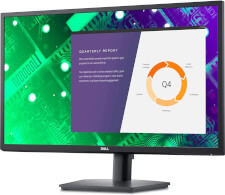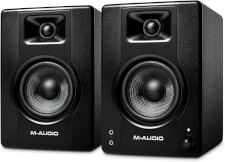Monitor
The term "monitor" in a computer context may refer to several different things. It is most often used synonymously with "computer screen" or "display." It may also refer to speakers for professionally monitoring sound, called "studio monitors." The term may be used as a verb, referring to monitoring computer performance or network activity.
Computer Screens
A computer's monitor displays its user interface, desktop, and open programs; it is the primary output device you interact with. Some computers have integrated monitors as part of the device, like a laptop or all-in-one computer. In other cases, the monitor is a separate device that plugs into one of the computer's ports — either VGA, HDMI, DVI, or DisplayPort. A computer may have several ports to support multiple monitors at once.
Most computer monitors are LCD screens designed specifically as computer monitors, but it's also common to use LCD and OLED televisions as computer monitors. Before LCD screens were available and affordable, computers used bulky CRT monitors.
Studio Monitors
In order to properly mix and master audio, professional audio engineers require extremely accurate speakers. Speakers designed for this purpose are called "studio monitors." Unlike consumer-focused speakers, which are often tuned to emphasize low-end and high-end frequencies, studio monitors replicate the audio frequencies as accurately as possible. Studio monitors are also designed for a short distance between the listener and speaker, as they are often placed next to a workstation only a few feet from the audio engineer, while speakers designed for home audio are meant to fill the whole room with sound.
Information Monitoring
When used as a verb, "monitor" refers to the practice of watching the flow of information. System monitoring utilities help a computer user track how much of their computer's processing power, memory, storage capacity, and network bandwidth is in use; it also helps track what programs and processes are using those resources. Regularly monitoring system activity can help spot unusual activity and troubleshoot problems.
 Test Your Knowledge
Test Your Knowledge
